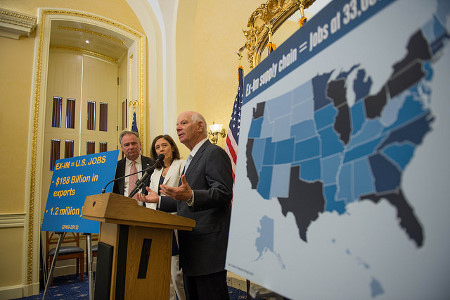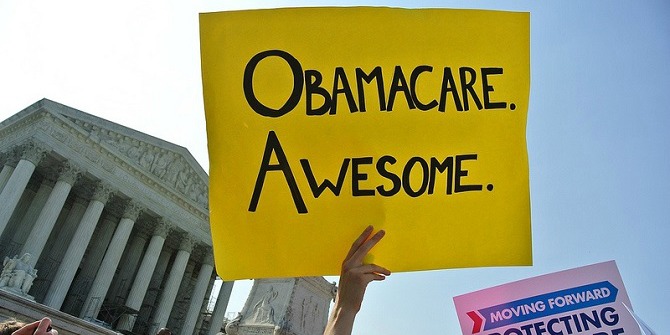USApp Managing Editor, Chris Gilson looks at the best in political blogging from around the Beltway. Our round-up of state blogs will follow on Saturday afternoon.
President Obama, the Democratic Party, the GOP and elections
The latter part of this week saw a major speech from President Obama on how the U.S. intends to tackle the forces of the terror group, Islamic State (also known as ISIS and ISIL), in Iraq and Syria, though it began with the President outlining that he would delay his much anticipated executive action on immigration until after the midterm elections in November. On Saturday, Red State writes that while Obama has made this decision to give relief to vulnerable Democrats in the midterm elections, this is not likely to be the outcome. They say that this is because his delay is a broken promise, as he has previously stated that he would not delay acting on immigration, and that the Democratic base cannot know if he will break his next promise to them. On Monday, Wonkblog argues that putting off immigration reform will not make it any easier. They write that if Obama waits until after the election to take action, he may face a Republican House and Senate, which might work to limit his executive power or even work to draft their own immigration reforms.
On Monday, the White House Dossier looks at Obama’s ‘optics’ after he recently stated in an interview that ‘heading for the golf course’ after making a statement about the murder of journalist James Foley by the Islamic State was a public relations mistake. They say that despite Obama’s claims that he does not understand political theatre, this has not been about ‘optics’, and that it was a failure of Obama’s leadership. National Journal is also critical of Obama this week, writing that his prioritization of short-term politics over sound policy is costing him badly. They say that with approval ratings on foreign policy and immigration in the 30 percent range, his administration has been hampered by ‘in-the-moment’ readings of public opinion rather than a big-picture strategy.
With the midterm elections only two months away, commentary on races across the country, and on the mood of the nation in general, was on the upswing. On Thursday, The Atlantic writes that the electorate is ‘anxious and unsettled’, with domestic and international security now preoccupying voters’ minds. They say that recent events like the disorder in Ferguson, Missouri, and the rise of the Islamic State in Iraq have pushed previously important issues, like the economy, into the background. The Monkey Cage writes this week on how the American middle class may be realigning towards the Democratic Party. They say that the increasing employment of the middle class in the knowledge and high-tech sectors mean that they benefit from Democratic initiatives in education, civil rights and research.
Looking more closely at the upcoming elections, PoliticusUSA says that Democrats are missing an opportunity to expose the Republican agenda which is to essentially dismantle the federal government if they win both the Senate as well as the House in Congress this fall. Meanwhile, The American Prospects looks at the Democrats’ chances of retaking the House of Representatives. They say that Democrats are concentrated in the cities, while Republicans are much more evenly distributed, giving them more districts with safe majorities. They say that while for now Democrats’ chances of winning back the House are very slim, all they need to do is wait until whites become a smaller and smaller portion of the American populace. On Friday, Red State reports on one characteristic of Democratic candidates for the Senate or Governor that may or may not be helping them: 93 percent are white, and 79 percent are male.
On Monday, The Campaign Spot looks at four Senate races where the Democratic incumbents look very vulnerable due to the small leads of GOP candidates: Alaska, North Carolina, Arkansas, and Louisiana. Meanwhile, Red State reports on two ‘schemes’ from Democrats in Michigan and Georgia that are aimed at ‘stealing’ elections through voter registration fraud.
On Sunday, Daily Kos takes a closer look at the GOP’s chances in the midterm elections, writing that that while many Republican candidates were held back in the 2010 and 2012 races because of their extremely conservative views on reproductive rights, in this election, it is their economic policies that are ‘sinking’ them. Meanwhile, National Journal writes that six Republican challengers and five incumbents are in favor of same-sex marriage, more than ever before. They say that the shift in GOP candidate attitudes reflects changing views in America, with 55 percent of people supporting legalizing gay marriage, up from 50 percent in 2012.
Last week, former Governor of Virginia, Bob McDonnell was convicted on corruption charges. The Atlantic writes on Thursday that the real scandal is that the political system severely punishes bribery, but allows massive campaign donations which can influence regulations and legislation.
Government, the Beltway and Congress’ agenda

Credit: Senate Democrats (Flickr, CC-BY-2.0)
The Export-Import Bank, which provides loans and support for U.S. exporters, has been placed under a great deal of scrutiny in recent weeks as Congress decides on whether or not it should be reauthorized. On Sunday, Red State writes that a new Freedom of Information request has revealed that officials from the Bank took more 400 first-class flights in the last three years, going well over the agency’s travel budget. Despite all the criticism aimed at the Bank recently, United Liberty reports that House Republicans were poised this week to temporarily reauthorize the agency, rather than risking a ‘big fight’ in the chamber. They say that the House GOP are doing exactly what President Obama wants them to do.
On Tuesday, Roll Call’s Beltway Insiders writes that newly minted House Majority Leader, Kevin McCarthy (R-CA), began his first day on the job by promising a return to regular order and procedures. They say that it is both a good start and a tall order for McCarthy, given the ‘culture of convenience’ in Washington that frees up members to fundraise for themselves and parties as well as four-day weekends in home states. The Daily Signal, meanwhile, wonders whether or not members of Congress are good value for money. They say that given that their total compensation (including benefits) is around $286,000, but also that they have failed to pass a full annual spending bill since 1997.
This week also sees United Liberty call Senator Chuck Schumer’s (D-NY) plans to introduce a new tax law unconstitutional. They say that Schumer’s proposed legislation would penalize companies that moved their headquarters overseas as far back as 1994. Given that the Constitution explicitly prohibits laws that prohibit activity after the fact, they day that it is a political move by Schumer, and that the bill has no chance of passing before members return home to campaign for reelection. On the other side of the aisle, Daily Kos writes that Senate Republicans voted this week to defeat a constitutional amendment that would have overruled the Citizens United Supreme Court decision that allows corporations from making independent expenditures on election communications – often in the form of attack ads.
On Wednesday, PoliticusUSA reports that House Republicans canceled a vote on a bill to fund the government until early December after President Obama asked for congressional authorization to arm rebels in Syria. They say that the House GOP are starting their ‘usual drama’ as they now only have five legislative days from next week to pass the Continuing Resolution.
Foreign policy, defense and trade
On Tuesday, The Feed looks at U.S, military spending, writing that the $600 billion allocated towards the armed forces (more than 1/3rd of the world’s total), does not ensure U.S. future military superiority. They write that, taking into account purchasing power, the Chinese economy looks much more competitive with that of the U.S., and that much of U.S. defence spending goes on wasteful projects such as the recent development of the F-35 warplane. Occasional Planet writes on Wednesday on the case of an atheist airman who was denied reenlistment because he refused to say “so help me God”, in his oath of allegiance. They agree with those that say that the compulsory nature of the oath is religious coercion that goes against the Constitution.
This week saw some important developments in U.S. policy towards the forces of the Islamic State in Syria and Iraq, with a major speech from the President on Wednesday. In the lead up to the speech, Informed Comment writes on the five signs that the U.S. is allied with Iran against Islamic State, including that U.S airstrikes against them have alternated with Iranian ones, and that both countries are helping the Iraqi Kurds through arms and air protection. Meanwhile, The Daily Signal writes that Obama should not try and work with Iran, as it would mean that the Iranians would get a green light to pursue their nuclear program and enjoy U.S. approval for their rising preeminence in the region.
Just ahead of Obama’s speech, Outside the Beltway writes that some questions need to be answered before the U.S. goes to war with the Islamic State. Chief among them, are: What is the exit strategy, and; What if the campaign goes badly? Hit & Run looks at what they say are the President’s ‘flip-flops’ on Congressional authorization for war, writing that one year ago he stated that it was right to take the debate to Congress, while now he seems to be going against the War Powers Resolution to take action. The Atlantic writes that Obama has realized that there is no way out of the Middle East and that while he has promised the eventual neutralization of the Islamic State, this task will be very hard, and he knows it.
Obama’s speech covered the expansion of airstrikes against the Islamic State into Syria, the training and support of Iraqi and Kurdish forces, and the expansion of aid to the Syrian opposition. Reaction to the speech was mixed, with conservative blogs taking a generally negative line. For The Daily Signal, it was short on surprises, and contained ‘hyperbole’ on the proposed comprehensive counterterrorism strategy. The White House Dossier says that Obama feels that the Islamic State is a ‘small group’, that it is a counterterrorism operation, and not a war, and that it can be won with a ‘half-assed’ effort, are all fatal delusions. Informed Comment says that Obama’s actions are defensive, given that he invoked similar U.S. actions in Yemen and Somalia (which they point out have largely failed). The American Prospect is not surprised that most Republicans were displeased with Obama’s speech, and says that the fundamental divide between Democrats and Republicans is that the GOP feels that the Islamic State is a threat to the U.S., even though there is very little evidence that that threat actually exists.
Obamacare and health policy

On Tuesday, Perrspectives reports that with many Republican election campaigns abandoning their ‘all-out war’ to destroy the Affordable Care Act (’Obamacare’), it is a sign that the program is here to stay. The American Prospect wonders if Republicans can actually be convinced to help to improve Obamacare. They say that some aspects of the law, such as the employer mandate need to be tweaked, and given that they are often aspects that conservatives don’t like, they would have an incentive to work with Democrats to change it. Meanwhile, Wonkblog writes that Obamacare has reduced the uninsured rate for most groups of people – except for children. They say that while people under 18 already had a low uninsured rate (7 percent), this has not budged in the first six months of 2014, while the adult’s rate has fallen by 4 percent in the same period. This lack of movement seems to be down to the fact that most of Obamacare’s coverage featured benefit adults.
One component of Obamacare has been the expansion of Medicaid in states who agreed to take federal money for this purpose. Hit & Run writes that under the expansion, the use of Emergency Rooms has greatly increased in Medicaid expansion states, something that the law had aimed to avoid.
The economy and society
This week, National Journal looks at what they term, is ‘America’s coal-fired divide’. They say that while Democratic leaning environmentalist states in the west, such as Oregon and California are embracing low carbon energy strategies, conservative, GOP dominated states such as Kentucky are mobilizing against new rules from the Environmental Protection Agency aimed at reducing carbon emissions.
On Monday, The American Prospect looks at a new survey which has found that the top 10 percent of white families own ‘almost everything’. They say that these families possess more than 75 percent of the nation’s wealth, and that the median white family has a net worth of $134,000, compared to $11,000 for a black family. Wonkblog also looks at racial inequality, finding that, according to Justice Department statistics, a black driver is 31 percent more likely to be pulled over (and searched) than a white driver. Only American Indian drivers are more likely to be pulled over.
Scotland’s independence referendum is getting attention on the other side of the pond, writes The Atlantic who say on Thursday that secessionists in Vermont, Cascadia, and in the South, are all hoping for Scottish independence, as they feel that it will have a positive effect on their causes.
And finally…
Roll Call’s At the Races looks at the importance of Major League Baseball coverage on midterm election races.
The Monkey Cage looks at the rise of pumpkin as a America’s favored flavor, and at the economics of reclining your seat on an already cramped airliner.
Featured image: President Barack Obama and Vice President Joe Biden meet with members of the National Security Council in the Situation Room of the White House, Sept. 10, 2014. (Official White House Photo by Pete Souza)
Please read our comments policy before commenting.
Note: This article gives the views of the author, and not the position of USApp– American Politics and Policy, nor of the London School of Economics.
Shortened URL for this post: http://bit.ly/1qNPs5O






